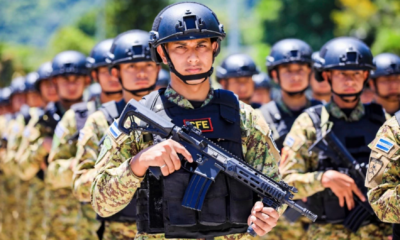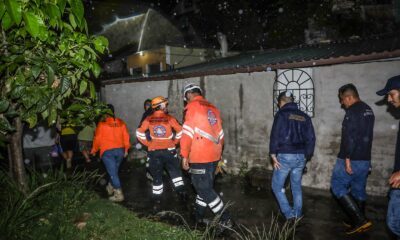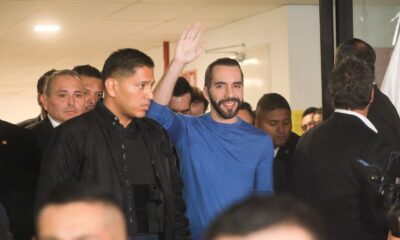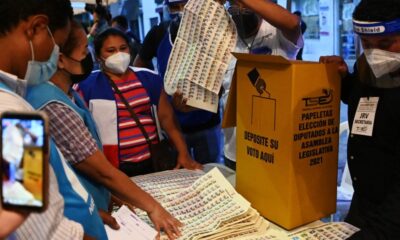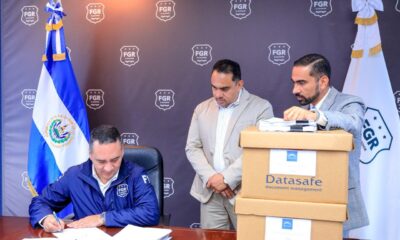Central America
Trial begins against 10 accused of helping Funes to appropriate more than $351 million
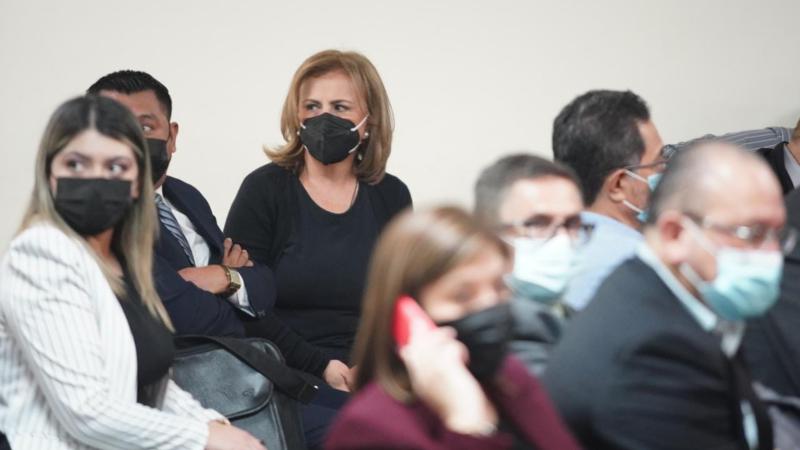
August 15|
In the case known as “Public Pillage” the First Sentencing Court of San Salvador, has begun this Tuesday the public hearing against 10 defendants linked to the corruption network that created the former president of the Republic, Mauricio Funes.
The Public Prosecutor’s Office of the Republic accuses for the crimes of money laundering, embezzlement (appropriation of state property) and special cases of money laundering.
The Public Prosecutor’s Office has more than 2,500 documents, 114 witnesses, financial and tax accounting experts and 21 international assistances, which were admitted in the preliminary hearing and which will begin to be evaluated by the court in the trial scheduled for one month.
The prosecutors intend to prove with financial, accounting and tax expertise that the defendants allegedly appropriated public funds that the Ministry of Finance allocated to the Presidency of the Republic for the reserved expenses between 2009 and 2014.
One of the key expertise is the accounting analysis made by an expert where he confirms that Funes in his presidential term used the mechanism of budgetary reinforcements to appropriate $351,035,400.
This expertise called “Forensic Financial Accounting Audit of Administrative and Functional Management” shows that in the records of the Ministry of Finance, between June 1, 2009 and June 1, 2014, it appears that the budget for the Reserved Expenses item that the Legislative Assembly approved for the Presidency of the Republic was $80,818,285.
But Funes, not satisfied with these funds, devised a criminal plan to increase the secret item known as “Item 54315 Reserved Expenses” through budgetary reinforcements.
The increase was 300% equivalent to $270,217,115.49, leading him to appropriate $351,035,400.49, in his entire administration and the people who today begin to be prosecuted were part of that criminal structure, according to the accusation of the Prosecutor’s Office. Funes fled justice in 2016 to Nicaragua.
As the plan was to lose track of those funds delivered as reserved expenses to the Presidency of the Republic, from the subsidiary account of the public treasury the money began to be transferred to accounts that were in the name of private individuals in the Banco Hipotecario.
The holders of these private accounts were Francisco Rodríguez Arteaga and Pablo Gómez, who were in charge of depositing the money through checks. These two people were also part of the network used by former President Antonio Saca.
According to the Public Prosecutor’s Office, these actions are serious because the accused violated the administrative regulations that already determine the mechanisms to be followed in the management of public funds.
The private attorneys at the time of initiating the trial have presented several petitions. One of them is a peremptory exception of res judicata in the case of Vanda Pignato.
The defense says that she was already judged in a civil trial for illicit enrichment of $135,536.15, funds with which she paid credit cards and other financial products, in that lawsuit she was absolved of responsibility and in this process of Public Plunder are the same facts accused which becomes a double judgment and that she be exonerated for the crime of money laundering.
The defense has also requested the exclusion of José Francisco Cáceres Saldaña, former private secretary of Mauricio Funes, as he was not duly granted the status of criterion witness.
They have also requested that some documents handed over by Cáceres Saldaña not be evaluated since the proper chain of custody was not followed.
They are also requesting not to take into account a point of expertise of a financial accounting analysis made on the reserved expenses and which affects David Rivas, former Secretary of Communications of the Presidency.
THE PENDANTS
1 Vanda Pignato, former First Lady, accused by the Prosecutor’s Office of money laundering and simulation of crimes.
2 José Miguel Antonio Menéndez Avelar, owner of COSASE, accused of money laundering, asset laundering and tax fraud.
3 Juan Carlos Guzmán Berdugo, former father-in-law of Mauricio Funes, indicted for money laundering and asset laundering.
4 Manuel Rivera Castro, former president of Banco Hipotecario, indicted for embezzlement, money laundering and asset laundering.
5 Rigoberto Palacios Panameño, former chief accountant, faces trial for embezzlement.
6 Luis Miguel Ángel García, accused of money laundering and asset laundering.
7 Francisco Rodríguez Arteaga, former financial manager of Casa Presidencial, indicted for embezzlement, money laundering and assets laundering.
8 Pablo Gómez, former technical assistant of the Presidency, accused of embezzlement, money laundering and assets laundering.
9 Jorge Alberto Hernández Castellano, former Treasury chief of Casa Presidencial, indicted for embezzlement.
10 David Rivas, ex-secretary of Communications of the Presidency, accused of money laundering.
Central America
Nicaragua’s Ortega and Murillo Mourn Pope Francis, Acknowledge ‘Difficult’ Relationship

Nicaraguan President Daniel Ortega and Vice President Rosario Murillo, who also serve as co-leaders of the country, expressed their condolences on Monday following the death of Pope Francis, acknowledging that their relationship with the late pontiff had been “difficult” and “troubled.” Nicaragua officially suspended diplomatic ties with the Vatican during his papacy.
“Our relationship, as Nicaraguans who are believers, devoted and faithful to the doctrine of Christ Jesus, was difficult and troubled—unfortunately shaped by adverse and painful circumstances that were not always understood,” Ortega and Murillo wrote in a message of condolence.
“Despite the complexity and hardships, despite the manipulation we all know occurred, despite everything, we kept our hope alive through Christian faith,” they continued. “We understood the distance, and above all, the complicated and strained communication that prevented better relations. We also recognized the confusion caused by strident voices that disrupted any attempt at genuine interaction.”
Pope Francis had previously compared the Ortega regime to communist dictatorships and even to Hitler, a remark that further strained relations between Managua and the Holy See.
Central America
Cardinal Rodríguez to Attend Funeral of Pope Francis: “He Was Very Dear to Me”

Honduran Cardinal Óscar Andrés Rodríguez announced on Monday that he will attend the funeral services of Pope Francis, who passed away at the age of 88 at his residence in Casa Santa Marta due to a stroke.
“We will be there throughout the novena and then, God willing, at the burial,” Rodríguez said in a phone interview with HRN Radio in Tegucigalpa, apparently calling from Spain.
He added that the last time he saw Pope Francis was in October 2024, during and at the end of that year’s synod, and that they remained in contact through email. “Sometimes, the Pope would even call me,” said Rodríguez, who was born on December 29, 1942, and was made a cardinal by Pope John Paul II on February 21, 2001.
Rodríguez expressed deep sorrow over the passing of Pope Francis, saying: “He was a very dear person to me.”
However, he also shared a message of hope, pointing out that the Holy Father passed away during Easter: “This is a sign. He gave his life completely like the Lord Jesus, and though he died, we believe in faith that he has risen, now with Christ in eternal life.”
Rodríguez, who for ten years coordinated the Vatican’s Council of Cardinals, was one of the eight cardinals selected by Pope Francis to help govern the Catholic Church and reform the Roman Curia.
In January 2023, upon turning 80, Rodríguez stepped down as Archbishop of Tegucigalpa, and Pope Francis appointed Spanish priest José Vicente Nácher Tatay as his successor.
Central America
Senator Van Hollen Meets with Deported MS-13 Member in El Salvador; Trump and Bukele React

U.S. Democratic Senator Chris Van Hollen, representing the state of Maryland, held a meeting in El Salvador with deported MS-13 gang member Kilmar Ábrego García, a member of the criminal group classified by the U.S. government as a terrorist organization.
“Kilmar Ábrego García, miraculously resurrected from the ‘extermination camps’ and ‘torture chambers,’ now sipping margaritas with Senator Van Hollen in the tropical paradise of El Salvador!” wrote President Nayib Bukeleon X (formerly Twitter), sharing photos of Van Hollen, Ábrego García, and a lawyer sitting together at a Salvadoran hotel.
The deported gang member is seen wearing a plaid shirt and a flat-brimmed cap, seated at a table with glasses and coffee cups. The senator also shared images of the meeting on his own social media accounts.
Bukele reaffirmed that Ábrego will remain in El Salvador and will not be returned to the United States.
“Now that his health has been confirmed, he has earned the honor of remaining under the custody of El Salvador,” Bukele added.
Former U.S. President Donald Trump criticized the senator’s meeting with Ábrego on Truth Social, calling Van Hollen “a fool” for advocating for Ábrego’s return to the U.S.
-

 Central America5 days ago
Central America5 days agoSenator Van Hollen Meets with Deported MS-13 Member in El Salvador; Trump and Bukele React
-

 Central America3 days ago
Central America3 days agoCardinal Rodríguez to Attend Funeral of Pope Francis: “He Was Very Dear to Me”
-

 Central America3 days ago
Central America3 days agoNicaragua’s Ortega and Murillo Mourn Pope Francis, Acknowledge ‘Difficult’ Relationship
-

 International5 days ago
International5 days agoPope Francis Appears for Easter Blessing, Calls for Peace and Religious Freedom
-

 International3 days ago
International3 days agoDominican Republic Declares Three Days of Mourning for Pope Francis
-

 International2 days ago
International2 days agoFrom the transfer of the coffin to the funeral, three days to say goodbye to Pope Francis
-

 International3 days ago
International3 days agoDHS Secretary Kristi Noem’s Purse Stolen in D.C. Restaurant Heist
-

 International3 days ago
International3 days agoPope Francis and Trump, a relationship of disagreements marked by migration
-

 International3 days ago
International3 days agoPope Francis: The Quiet Architect Behind the U.S.-Cuba Thaw
-

 International3 days ago
International3 days agoWithin Francis’ private wake: respect and prayer for the deceased pope
-

 International2 days ago
International2 days agoA very heterogeneous and divided conclave will elect the new pope
-

 International2 days ago
International2 days agoModi returns to India and shortens his visit to Saudi Arabia after a deadly attack in Kashmir
-

 International3 days ago
International3 days agoTrump’s emissary will visit Russia this week for consultations on the arrangement in Ukraine
-

 International3 days ago
International3 days agoThe pope last called the Gaza parish on Saturday and asked about the children
-

 International3 days ago
International3 days agoAmerican universities and colleges sign a letter against Trump’s policy
-

 International3 days ago
International3 days agoCardinal Becciu’s enigma: will he enter the conclave?
-

 International3 days ago
International3 days agoThe Government of Colombia presents twelve questions that it will propose in a popular consultation to promote its reforms
-

 International3 days ago
International3 days agoA candidate for the Supreme Court denounces an unequal dispute in the judicial election of Mexico
-

 International2 days ago
International2 days agoMaradona’s house arrest is again a focus of tension in the trial for his death
-

 International2 days ago
International2 days agoEl Salvador formalizes the proposal for the exchange of Venezuelan deportees, according to Bukele
-

 International2 days ago
International2 days agoThe Peruvian Public Ministry denounces the former attorney general for an alleged corruption case
-

 International3 days ago
International3 days agoBurma’s military junta extends ceasefire until April 30 due to the earthquake
-

 International2 days ago
International2 days agoA judge orders the Trump Government to restore Voice of America services
-

 International3 days ago
International3 days agoRoyal quinoa, the superfood that grows in front of the largest salt flat in the world in Bolivia
-

 International3 days ago
International3 days agoInternational leaders begin to confirm their presence at Pope Francis’ funeral
-

 International2 days ago
International2 days agoThe president of the World Bank underlines his intention to lift his veto on nuclear energy
-

 International2 days ago
International2 days agoDonald Trump will visit Saudi Arabia, Qatar and the United Arab Emirates in mid-May
-

 International3 days ago
International3 days agoChurch charges ceased or resigned in the papacy of Francis for cases of pedophilia
-

 International7 hours ago
International7 hours agoThe Arab League supports Hamas handing over control of Gaza and weapons to the Palestinian Authority
-

 International2 days ago
International2 days agoMarco Rubio reorganizes the State Department to eliminate offices and jobs
-

 International2 days ago
International2 days agoA judge in the United States stops the deportation to El Salvador of a hundred Venezuelans
-

 International2 days ago
International2 days agoThe Brazilian Supreme Court opens trial against six others accused of leading the coup attempt
-

 International7 hours ago
International7 hours agoMigrants want to stay on Mexico’s southern border because of Sheinbaum’s industrial plan
-

 International7 hours ago
International7 hours agoThe pope’s doctor reveals his last moments of life and that he wanted to “die at home”
-

 International7 hours ago
International7 hours agoThe Pope’s funeral procession through the center of Rome worries the Italian authorities
-

 International7 hours ago
International7 hours agoFrom email to marriage: the day Pope Francis married a Uruguayan couple
-

 International7 hours ago
International7 hours agoA group of the poor and a delegation of migrants will participate in the funeral and burial of the pope on Saturday








































































